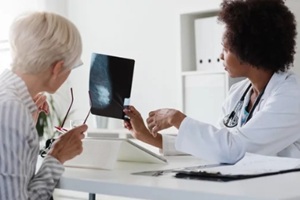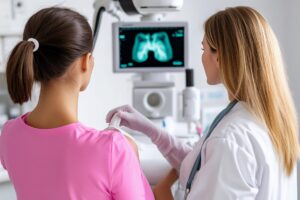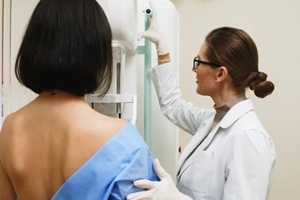 Many factors, such as dietary habits and exposure to harmful substances, impact the risk of breast cancer. However, one of the most impactful drivers behind the development of breast cancer is a family history. If other people in a woman’s family have experienced breast cancer, those related to them may have an increased risk as well.
Many factors, such as dietary habits and exposure to harmful substances, impact the risk of breast cancer. However, one of the most impactful drivers behind the development of breast cancer is a family history. If other people in a woman’s family have experienced breast cancer, those related to them may have an increased risk as well.
Women at increased risk for breast cancer based on family history may require modified breast cancer screening, including earlier mammography, more frequent breast exams or even additional forms of breast imaging such as breast MRI or ultrasound.
Each woman needs to understand her family history to make wise decisions about her breast healthcare. Those who no longer have access to their family history, such as in the case of closed adoptions, still have options to uncover whether they, too, face a higher risk.
The Genetic Component of Breast Cancer
The reason that some people face a higher chance of developing breast cancer than others comes down to heredity. Because a person’s genes are influenced by their parents, some problematic genes can continue to move through generations. In fact, between 5% and 10% of breast cancer cases are in those with an increased risk through family history. Multiple genetic factors may increase breast cancer rates. Several genes have been identified related to breast cancer risk.
About 70% of what contributes to breast cancer development via heredity is still not clear; what doctors do know is that when people’s family history predisposes them to breast cancer, they may also face an increased risk breast cancer that develops on both sides, a younger than average age of cancer onset, and an increased risk of other types of cancer such as ovarian cancer.
Who Is at Risk?
Knowing whether a woman is facing an increased risk of cancer due to genetics can be challenging. The main people who must contend with higher risk are:
- Those with a known genetic mutation (such as BRCA1 and BRCA2, or “breast cancer gene 1/2″)
- Anyone of Jewish ancestry
- Those whose family has had previous cancer development at young ages
- Those whose parent or sibling had breast cancer before age 40 (or, if male, developed breast cancer at all)
- Those whose parent or sibling developed cancer in both breasts, regardless of age
- Those whose family has had at least three cases of breast cancer among parents, siblings, aunts, uncles, and grandparents
How to Be Assessed for Genetic Risk
 Genetic counseling is available for those who have been deemed high-risk due to their family history. Doctors still cannot test for every factor that contributes to an increased risk of cancer, but several genes have been identified that can contribute to breast cancer risk.
Genetic counseling is available for those who have been deemed high-risk due to their family history. Doctors still cannot test for every factor that contributes to an increased risk of cancer, but several genes have been identified that can contribute to breast cancer risk.
In addition to BRCA1 and BRCA2, the most common genetic variants associated with increased risk, other things the genetic test may uncover relate to genes such as:
- TP53
- CDH1
- PTEN
- STK11
- RAD51C
- RAD51D
- ATM
- CHEK2
- BRIP1
- PALB2
Patients do not need to know what these genes mean or stand for! Instead, they should understand that many genes can contribute to breast cancer risk, often because the genes are “turned off.” Where most people’s genes work to suppress tumors or accurately copy DNA, people who have the above-mentioned genetic variants may not have tumor suppression genes that are properly activated, or their DNA may be more likely to be copied incorrectly.
How Family History Impacts Mammograms
A person’s family history should indicate how often they schedule their mammograms. Women with no family history should receive a mammogram at least once every other year, ideally once a year, starting at age 40. Those with the BRCA genes or other variations still receive a mammogram only yearly.
However, they may also be encouraged to get a breast MRI annually to provide further visualization of the breast tissue. These screenings also typically start earlier for those with a family history, potentially as young as 25, depending on the details.
Get Your Mammograms Often
 Mammograms are an invaluable tool for diagnosing breast cancer, both in those with no family history and those whose families have faced this health challenge before. Knowing your breast cancer risk from genetics is essential for making smart decisions about your healthcare and when to receive screening.
Mammograms are an invaluable tool for diagnosing breast cancer, both in those with no family history and those whose families have faced this health challenge before. Knowing your breast cancer risk from genetics is essential for making smart decisions about your healthcare and when to receive screening.
The friendly team at Raleigh Gynecology & Wellness is always happy to welcome our patients who have questions about the genetic components of their health. Our women-only team understands that uncertainty around cancer risk can cause much anxiety, and we are happy to help you stay healthy and informed! Contact Raleigh Gynecology & Wellness today to schedule an appointment.
